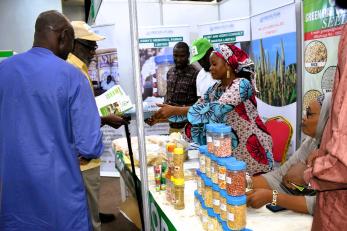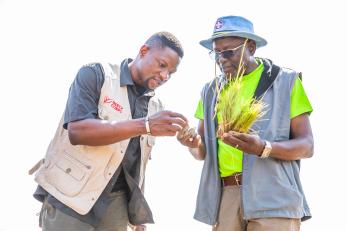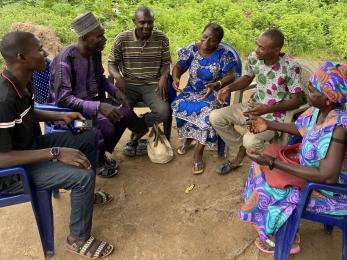Building Climate Resilience Through Improved Access to Seeds

In the face of mounting challenges, smallholder farmers in Northeast Nigeria are finding renewed hope through innovative agricultural interventions. As climate change continues to disrupt traditional farming systems with unpredictable weather patterns, food insecurity has emerged as a pressing concern. Limited access to quality agricultural inputs has further exacerbated these challenges, leaving many communities vulnerable to hunger and economic instability.
Recognising the urgency of this situation, the Feed the Future Nigeria Rural Resilience Activity (RRA) has stepped in with a bold vision to transform agriculture and build resilience in the region. By focusing on strengthening seed systems and improving farmers' access to climate-resilient, high-yield seeds, RRA is paving the way for a more secure and sustainable future for smallholder farmers and their communities.
The Challenges Facing Smallholder Farmers
Northeast Nigeria has long been a region of agricultural potential, but the past decade has brought unprecedented hurdles for farmers. Climate change has intensified droughts, floods, and erratic rainfall, making traditional farming practices less effective. Additionally, access to quality seeds, fertilizers, and other agricultural inputs remains limited due to weak market systems, poor infrastructure, and ongoing conflicts.
For smallholder farmers, who constitute the backbone of the region’s food production, these challenges have translated into lower yields, higher production costs, and greater vulnerability to food insecurity. Without access to improved seed varieties that can withstand harsh climatic conditions, many farmers are unable to adapt to the changing environment or improve their livelihoods.
I wish I had this experience before starting my seed company, I have seen and learnt how hybrid seeds are produced.
Managing Director/CEO, Wonotanzokan Farms Limited
RRA’s Approach: Building Resilience Through Seeds
To address these challenges, the RRA has implemented targeted interventions aimed at strengthening the region’s agricultural systems. At the heart of this approach is the focus on improving access to high-quality seeds that are tailored to the region’s unique environmental conditions. These seeds are not only more resilient to climate shocks but also capable of delivering higher yields, thereby enhancing food security for farming households.
The initiative involves collaboration with key stakeholders, including local seed companies, agricultural extension services, and community-based organisations. Together, they work to:
- Enhance Food Security and Productivity: By introducing high-yield, drought-resistant seed varieties, farmers are able to achieve better harvests, even under challenging climatic conditions. This not only improves household food security but also contributes to broader market stability.
- Support Adaptation to Climate Shocks: Climate-resilient seeds provide farmers with a critical tool to mitigate the impacts of erratic weather patterns. These seeds are specifically designed to thrive in conditions such as prolonged dry spells or heavy rains, enabling farmers to sustain their livelihoods despite environmental uncertainties.
- Promote Sustainable Agricultural Practices: Alongside seed distribution, RRA promotes training and capacity-building programmes to ensure that farmers adopt sustainable farming practices. This includes techniques for soil conservation, water management, and integrated pest control, all of which contribute to long-term agricultural resilience.
The number of seed companies using the platform increased from 12 in 2022 to 22 in 2024, an 83% increase, and is currently being used by 50% of seed companies operating in the Northeast. The number of digital transactions on the platform and number of farmers onboarded also increased by 1,787.5% and 54% respectively from 2022 to 2024. Given the great interest in this technology from farmers and seed companies, the firm hosting the NIGSIMS electronic platform is looking to expand their business to include other types of agricultural inputs and cover additional regions of Nigeria, which will allow it to operate independently from RRA.
Success Stories: Farmers Leading the Way
The impact of RRA’s interventions is already evident in the stories of farmers who have embraced the new seed varieties and practices. In communities across the region, farmers report significant increases in yields and income, allowing them to invest in education, healthcare, and other essential needs for their families. Moreover, the availability of improved seeds has sparked renewed interest in agriculture among young people, creating a pathway for economic empowerment and stability.
Looking Ahead: A Collaborative Effort
Building climate resilience in Northeast Nigeria is not a task that can be accomplished by one organisation alone. It requires a concerted effort from government agencies, private sector actors, non-governmental organisations, and local communities. The success of RRA’s seed systems initiative demonstrates the power of collaboration in addressing complex challenges and creating sustainable solutions.
As the global community continues to grapple with the impacts of climate change, the lessons from Northeast Nigeria offer valuable insights into how targeted interventions can make a difference. By investing in resilient agricultural systems, we can ensure that vulnerable communities are not only able to survive but thrive in the face of adversity.
Case Study: Albit and Agro Consult
Albit and Agro Consult, a small seed company, received a de-risking and co-investment grant from EIF of 25,000 USD in 2020. When Albit and Agro Consult applied for the grant, they had one field office and five staff in the Northeast and worked with only two seed out-growers who each produced only one variety of either maize or rice. RRA worked with Albit and Agro Consult staff to provide technical support and training to their seed out-growers and enroll additional out-growers. RRA facilitated access to foundation seeds for the out-growers and encouraged Albit and Agro Consult to work with NASC to comply with certified seed production requirements.
Albit and Agro Consult were able to participate in trade fairs, linkage events, and exposure visits to grow their customer base. They established 30 demonstration sites and trained 3,000 farmers. As of 2024, Albit and Agro Consult operates six field offices and has increased staffing to 49 in the Northeast. They work with 150 seed out-growers to produce four crops (maize, rice, sorghum and soyabeans) and a total of six varieties. They were able to increase their volume of seed produced and sold from 9.8 MT in 2020 to 204.8 MT in 2023. With their large out-grower network, they are frequently able to supply other companies with seed. They have initiated many business growth activities inspired by RRA, including organising an input fair with other private sector actors in Adamawa State, linking members of a farmers’ cooperative they work with to a formal financial service provider, and working with NASC to continue to provide technical training to their out-grower network. They are now an established partner to several government agencies and a key player among private sector actors operating in the Northeast.

For a deeper dive into how improved access to seeds is transforming lives in Northeast Nigeria, check out RRA’s latest learning brief, “Building Climate Resilience through Improved Access to Seeds in Northeast Nigeria.” The brief explores the strategies, successes, and ongoing efforts behind this impactful initiative.
Together, we can create a future where farmers are empowered, communities are resilient, and food security is no longer a distant dream but a shared reality.


